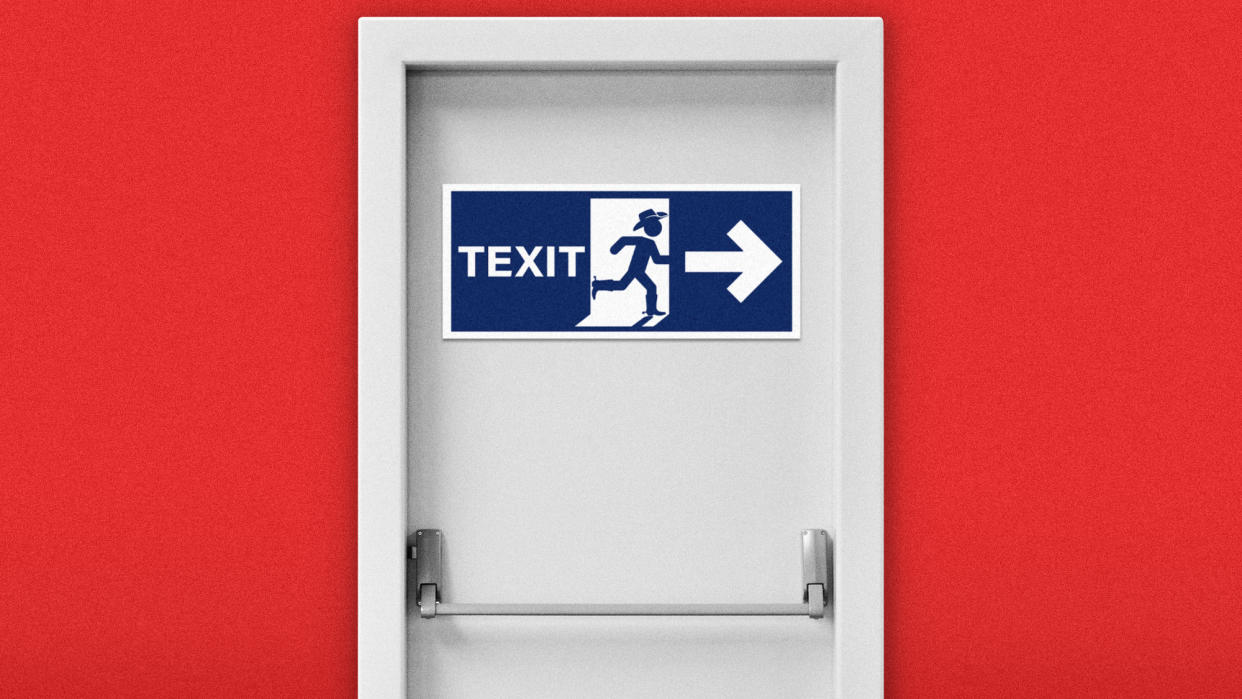Why is the Texas secession movement having a moment?

- Oops!Something went wrong.Please try again later.
- Oops!Something went wrong.Please try again later.
It is a telling and quirk of linguistic sociology that it took a bloody civil war to convince the bulk of Americans to shift from referring to the United States as a singular, rather than plural, grammatic entity. It's a change, Penn University political science professor Melissa Lee explained in a 2022 interview, that "reflects our values and what we think is important" — in this case establishing that the nation's sovereign authority ultimately lies at the federal, rather than state level.
Still, while the question of whether America is a single nation or merely a conglomeration of disparate states has been largely settled for nearly two centuries, there remains a strong undercurrent of secessionist agitation in certain corners of the country dissatisfied with federal governance. By dint of both historical precedent and internalized mythology, that sentiment has often found fertile ground in Texas, where secessionist calls have grown louder and more strident as a standoff between state and federal officials at the Rio Grande border between Mexico and the United States has inflamed an already fraught debate over who can set — and enforce — immigration policy.
This week, Republican presidential candidate Nikki Haley kicked the debate over Texas secession to new heights, telling "The Breakfast Club" that "states have the right to make the decisions that their people want to make," and "if Texas decides they want to do that, they can do that." Despite later telling Fox News that "it's not about secession. Nobody's going to do that," Haley's comments are a sign that Texas secession is having a moment.
What did the commentators say?
Texas' history of secessionist flirtation has "gone from a 'nod to it and ignore it' issue to one with a bit more urgency" lately, according to Texas Monthly's Dan Solomon, citing both Gov. Greg Abbott's (R) border-security standoff with the Biden administration and a recent effort to allow Texans to vote on secession (the push was thrown out over allegations that many of the requisite number of signatures submitted were invalid. The Texas Nationalist Movement said in December that leaders "fully intend to litigate" the rejection).
In an interview with the Texas Tribune, longtime Texas Nationalist Movement leader Daniel Miller stressed that Abbott's standoff with Biden "validates and confirms" his group's position that "if Texas ever wants to truly secure its border" it must be as an "independent and self-governing nation."
To support this, secessionists point to Abbott's Jan. 24 statement that Washington has "broken the compact between the United States and the states." This language, echoed in a supporting statement by more than 20 other Republican governors, is "strikingly similar" to that used by the slave states in their pre-Civil War push to secede, according to Slate. This "compact theory" has, in fact, been rejected by presidents and Supreme Courts for centuries, meaning "Nikki Haley is wrong, as is anyone else who treats secession or nullification as legitimate features of the American constitutional order," The New York Times' Jamelle Bouie wrote on Friday.
Constitutionality notwithstanding, Abbott's secessionist dalliance is "resonating powerfully with the GOP's far-right faction" and should be seen more through the lens of "politics" than "policy," argued Time's Philip Elliott. While Abbott may be "talking so openly about seceding from the country" he is ultimately "putting in place component parts of his profile to lead it."
What next?
While outright secession is almost certainly a non-starter, University of Texas historian and democracy scholar Jeremi Suri told Texas Monthly's Solomon that he could "imagine a situation" in which Texas could someday vote on the issue as a "negotiating tactic to push for" expanding its state rights while limiting those of the federal government.
At the same time, there are practical limitations on outright secession beyond the constitutionality of such a schism. By leaving the United States, Texas would lose "billions in transportation funding" and see "millions of seniors" kicked off their Medicare coverage, according to an investigative series by Newsweek. Texas independence would impose "exorbitant costs" on the state and its citizens, Solomon agreed.
Nevertheless, this week former President Donald Trump endorsed Texas secession advocate David Covey, who is running for a seat in the State House.

